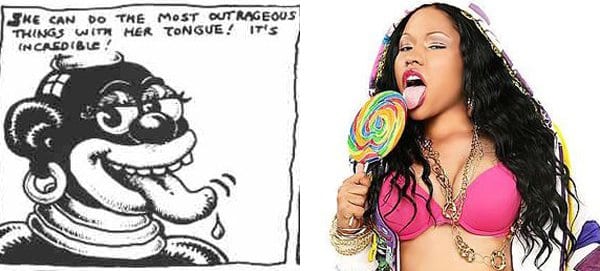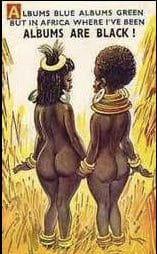Last week, Nicki Minaj released the artwork for her new single “Anaconda,” featuring the rapper in a squat position with her large posterior aimed directly at viewers. The image was met with mostly support from fans and critics but some questioned if the image was “too racy.” In response to those criticisms, Minaj tweeted several Sports Illustrated photos with White swimsuit models in similar poses and the message “angelic” and “acceptable,” hinting at society’s racial bias that does not treat Black bodies with the same respect as White ones — a statement that was met with more controversy.
There is validity to her observation. I have written on countless occasions about society’s rampant efforts to diminish and devalue the Black female body. However, I’m surprised — considering the fact that Minaj’s entire career is built on racist body politics — that the rapper’s remarks were met with controversy. After all, Nicki’s brand capitalizes on racial stereotypes while reinforcing notions of Black female hypersexuality that are long established racist tropes.
In the beginning of her rap career, Nicki Minaj was a femcee (female emcee) known for her creative lyrical ability and street style. After signing a 360 deal with Young Money Entertainment, the rapper received a complete makeover equipped with butt and breast implants, transforming her once petite frame into a curvaceous money-making machine. In response to early inquiries about the realness of her posterior, Minaj told MTV2:
“I don’t mind the questions, I don’t mind the fascination … But I’ve said this before, it doesn’t define me.”
Nicki’s ass may not define her, but it most assuredly defines the brand that puts her net worth at $45 million. Her brand built on a spectacle, a Black woman’s backside, says something more insidious about American culture and its views on the Black woman’s body than her social commentary ever really can.

Source: pinterest
The stereotype of the over-sexed Black Jezebel has long been America’s go-to archetype used in entertainment since the country’s inception. This image is rooted in White supremacist, patriarchal ideas developed when Europeans first encountered African tribal women and in America’s history where White slave holders blamed Black hypersexuality for the rape of women slaves. For that reason, there has always been an incentivized space to display, exploit and monetize the myth of black female lewdness through images and music. Historically, it has been the easiest way for White men to avoid taking responsibility for the abuse and misuse of Black female bodies.
In today’s America where the CDC reports that Black women are between 6-17 times more likely to suffer from sexually transmitted diseases due to social and economic conditions including poverty, income inequality, unemployment and low educational attainment, the need for a modernized scapegoat used to avoid culpability for the Black condition has never been more dire. Nicki Minaj is the current walking embodiment of that tradition of stereotype-enabled victim-blaming, proving that as a society, America has yet to defeat its racist notions and will even continue to invoke them to the economic and social benefit of the Whiter man.

Source: jezebel.com
This implicates Nicki Minaj and her brand in an unforgivable way. As the face of the modern perpetuation of a stereotype created to serve and justify White male dominance, Minaj and her multi-million dollar empire represents everything wrong with our current perception of blackness and more specifically, Black female sexuality.
In the entertainment business, brands are shaped by what we — the consumer — consider realistic and socially acceptable. For example Blonde-haired, blue-eyed Taylor Swift can build a brand around the image of “The All-American Sweetheart,” because there is still a common belief that “Whiteness” connotes All-Americanness. Imagine a Mexican-American or Chinese-American singer making the claim that she is the All-American girl next door. She most certainly would not be as widely accepted because our collective consciousness, shaped by White supremacy, still cannot connect the country’s multi-ethnic reality with the longstanding and widely-accepted fictionality that “American” equates
“White.” The fact that the American psyche still holds a space for the myths of Black hypersexuality to be exploited and to have an audience big enough to generate millions of dollars, says everything we need to know about how we collectively view Black women’s bodies.

Source: jezebel.com
If Nicki Minaj existed in a world where racial bias and stereotypes did not reign supreme and the Black female body was treated with the same respect as the White female body, then her brand would be a major fail. For that reason, it is best that she not challenge the status quo — not if she wants to continue having a successful career, anyways. For us, the consumers and participants in this continued injustice, we must begin to question and challenge our beliefs if our shared goal is, indeed, equality for all women. And we most certainly should not wait for those participating in and profiting from the degradation of the Black woman’s image to tell us to do so.
Original by: Tiffanie Drayton
